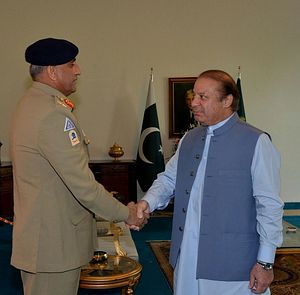As General Raheel Sharif retired from the post of Pakistan’s army chief, Lieutenant General Qamar Javed Bajwa was appointed as the 16th chief of army staff (COAS) in Pakistan. While his professionalism as an army person and the resumption of India-Pakistan border tensions made headlines as reasons for his appointment, those headlines failed to shed a light on the major driving factor: the China-Pakistan Economic Corridor (CPEC).
There is a widespread view that Bajwa was appointed for his reputation of being a professional army person and that his appointment was made in order to check decades of India-Pakistan regular border issues in Kashmir. It is widely thought that, considering Pakistan’s history of military coups, Prime Minister Nawaz Shariff believed that an army professional like Bajwa would be the right person as the army chief, since he would be less interested in hopping into state politics. Although this analysis was not wrong, this is not the major reason behind Bajwa’s appointment.
Other argue that in a bid to put the highest-ever focus on Kashmir, Pakistan’s Prime Minister Nawaz Sharif made sure that a man with huge expertise on Kashmir was appointed as the COAS. Many believe that the recent tension along the Line of Control in Kashmir (militant attacks in India allegedly originating from Pakistan and India’s retaliation through the alleged surgical strikes on Pakistan’s side of the LoC) is the sole reason behind Pakistan’s efforts to further increase its military focus on its side of Kashmir, leading to Bajwa’s appointment. This is outright wrong, as tensions with India regarding Kashmir is nothing new and there is already heavy military presence to tackle the issue.
In fact, the decades-old Kashmir-centric rivalry between India and Pakistan has made border disputes a very regular and normal issue not just for the people from both sides, but also for the members of armed forces from both of the neighboring countries. Why then has Pakistan’s focus on Kashmir suddenly increased by many times compared to the past, given that such tensions between Pakistan and India have existed since the independence of these two Asian countries?
The major reason for the increased emphasis is China and Pakistan’s joint desire to see the success of the China-Pakistan Economic Corridor (CPEC), which runs through Pakistan-administered-Kashmir (PAK). Both these countries are appearing desperate to make sure that nothing stops the project from becoming a reality.
CPEC: The Real Reason Behind Bajwa’s Appointment
Bajwa has extensive experience in handling Kashmir affairs and Gilgit-Baltistan affairs (formerly known as the Northern Areas) as he was posted three times in the Pakistan Army’s famous 10 Corps, which is responsible for the area along the Line of Control with India. Also, he was commissioned in the 16 Baloch Regiment and served as an instructor at Command and Staff College in Quetta, the provincial capital of Balochistan.
Thus, a major consideration in Bajwa’s appointment is the fact that CPEC has its two geographical ends at two problematic areas, namely Balochistan and Kashmir, both of which are familiar to Bajwa. Thus, Nawaz Sharif perhaps thought that Bajwa has the expertise required to tackle any threats against CPEC in those two problematic areas.
CPEC’s short introduction is that it is China’s only reliable non-Malacca route to the Indian Ocean. China has a huge geographic handicap as it has no direct access to the Indian Ocean. Therefore, the shipments from Europe, the Middle East, and Africa have to reach China by traveling all the way around India, through the Malacca Straits, and past Southeast Asia. China has serious problems with several countries along this route, largely due to territorial and maritime disputes. Thus, China considers it to be in Beijing’s best interests to manage a route through Pakistan to access the Arabian Sea and western part of the Indian Ocean, saving both distance and transportation costs. That is what CPEC means for China.
CPEC would be a corridor of highways and railways that will run from China’s Kashgar (near Pakistan’s Kashmir) to Pakistan’s Gwadar (Balochistan) on the Arabian Sea near the Iranian border.
With regard to CPEC, the “Karakoram” would be the key highway that connects China and Pakistan. Karakoram is in Gilgit-Baltistan, which is adjacent to Pakistan administered Kashmir (PAK). Pakistan army’s newly appointed chief, Qamar Javed Bajwa, was posted there. Thus, given the imminent need of maintaining a secure Karakoram highway for CPEC, the appointment of an army chief who could well be regarded an expert of the area, does not seem to be coincidental, but a purposeful act on the part of Pakistani establishment in order to secure CPEC.
Kashmir is at one edge of CPEC; at the other edge there is Balochistan, where separatist movements are heating up. The increasing unrest in Balochistan and its importance to CPEC are directly related to the fact that the newly appointed army chief, who was commissioned in the 16 Baloch Infantry Regiment, had served as an instructor at Command and Staff College in Quetta, the provincial capital of Balochistan. An army person who is familiar with Balochistan would be viewed as the right person to suppress the Baloch separatist movements and other issues within the province in order to make sure that the CPEC is not interrupted in any manner.
All in all, it appears that Qamar Javed Bajwa’s mission is to make sure that the process of making CPEC a reality remains uninterrupted.
Bahauddin Foizee is a Dhaka-based international affairs columnist. His articles have appeared in many international outlets including Asia Times, Eurasia Review, International Policy Digest, and Modern Diplomacy. He, as a columnist, has regular presence in leading Dhaka-based English dailies, including The Independent, The Financial Express, Daily Observer, and Daily Sun.

































